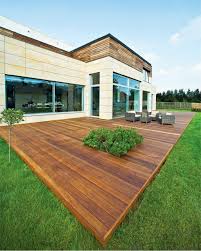When selecting deck boards for the outdoor area, you need to take into account their environmental impact. Decking materials differ widely and knowing their environmental footprint will help you make a better choice for sustainability. Here’s the information you need to know about the environmental impact of various Deck boards (Deski tarasowe):
1. Wood Deck Boards
Traditional wood deck boards that are constructed from redwood, cedar and pressure-treated wood, are renowned for their natural aesthetic and long-lasting. But their impact on the environment is different:
Cedar and Redwood They are typically harvested sustainably from managed forests, which can make them an eco-friendly choice. However, their demand can lead to the destruction of forests if not sourced responsibly. Cedar and redwood are also very low in toxicity, and can be treated using eco-friendly sealants.
Pressure-Treated Lumber: This type of lumber is treated with chemicals to prevent decay and insects. Historically, treatments contained arsenic, however current treatments aren’t as toxic. Still, pressure-treated wood can leach chemicals into the soil and into the water in time, causing environmental issues.
2. Composite Deck Boards
Composite decking is made from a blend of wood fibers and plastic that is usually recycled. This makes composite decking eco-friendly in many ways:
Recycled Content: Several composite deck boards are manufactured using recycled plastic and wood materials which reduces the need for virgin resources as well as diverting the waste from landfills.
Durability: Composite decks are known for their durability and low maintenance. This will make it less frequent for replacements and refinishing. This can reduce their overall environmental impact over time.
Composite boards are not biodegradable. At the end of their lifespan, they will remain in landfills until they are recycled, which can be an issue.
3. Plastic Deck Boards
Plastic deck boards are manufactured entirely of synthetic materials, such as recycled plastics. They have several advantages for the environment:
Recycled Materials: A lot of plastic deck boards are constructed of recycled plastics, which helps reduce waste from plastic and minimize reliance on new materials.
Durability and Low Maintenance: Plastic decks are resistant to insects, weather, and decay, which can prolong their lifespan and cut down on the requirement to maintain them. They can also be recycled which may help to alleviate certain environmental issues towards when they reach the conclusion of their lifespan time.
4. Bamboo Deck Boards
Bamboo is a rapidly renewable source, which makes it an environmentally friendly option:
Sustainability: Bamboo is a fast-growing plant and is able to be harvested without killing the plant, which makes it a more sustainable choice in comparison to conventional hardwoods.
Durability: Bamboo decking can be as strong as hardwood if properly handled, however its environmental benefits are enhanced when it is harvested sustainably and treated.
Conclusion
When selecting deck boards, think about the material’ sustainability, longevity and disposal at the end of their life. Choosing recycled or sustainably sourced materials can significantly reduce the environmental impact while enjoying a beautiful outdoor space.


